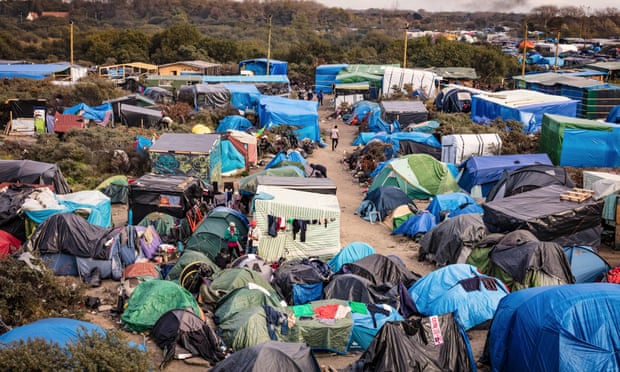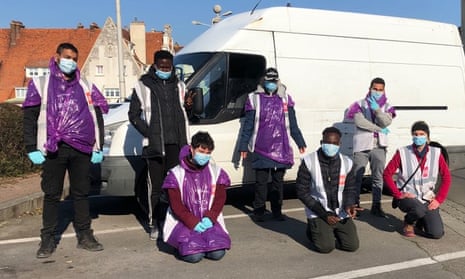Up to 2,100 refugees in Calais and Dunkirk are facing an imminent coronavirus lockdown by French authorities, with many saying they will try to reach the UK rather than go to accommodation centres if their camps are cleared.
Buses will be sent to the camps to transfer refugees to centres housing up to 100 people from Tuesday. The transfers are said to be voluntary but some of the refugees told the Guardian that they distrust the police and are fearful of being forced into the centres, so plan to run away and continue in their attempts to cross the Channel.
Q&AThe Calais camp explained
Show

Why did
Calais
become a
staging post?
Refugees have been gathering in Calais on their way to the UK for decades. Periodically the French authorities attempt to prevent them from coming but asylum seekers continue to arrive. Some pay people-smugglers to get them into lorries parked near the port while those who have no money try to conceal themselves in moving trucks.
Who travels to camps on the Channel?
Many asylum seekers have relatives or friends in the
UK or have some level of English language skills. But
the 1,000 or so refugees currently living in Calais and
Dunkirk represent a very small proportion of refugees
seeking asylum across Europe.
Although the situation in Northern France attracts attention because it is at the UK border, the numbers gathered here are tiny compared with the 100,000- plus who arrived in Europe in 2017, the vast majority of whom intend to claim asylum elsewhere in Europe.
What are politicians doing to change the situation?
The British government contributed to a £17m joint Anglo-French package of security measures, including the construction of a 1km-long concrete wall, aimed at preventing asylum seekers from getting close lorries arriving at the port.
But charities say extra security does not prevent the arrival of new refugees. They want the British government to make it easier for vulnerable unaccompanied children to travel legally and for France to accept that there will always be some refugees in Calais, and provide dignified reception centres.
Conditions in the camps are worsening, with shortages of food, water and showers as NGOs are forced to pull out because of the coronavirus pandemic, although no cases of Covid-19 have been reported in the camps.
Many refugees – mostly from Afghanistan, Eritrea, Iran, Iraq and Sudan – often make repeated attempts to cross to the UK. Last year, 1,900 reached the UK by boat, with many others arriving by lorry. Eighty migrants are understood to have reached the UK by boat last week, with some reports of around 160 attempts in one day.
While numbers are disputed, internal documents collated by NGOs in the area and seen by the Guardian revealed there are about 1,500 people in Calais, including 160 unaccompanied children, the youngest of whom is 11. There are about 600 people in Grand Synthe in Dunkirk, including around 35 families. Some have serious health problems such as diabetes, and others have suffered broken limbs including a broken arm and a broken jaw.
A 16-year-old boy from Sudan told the Guardian that he planned to run away and cross the Channel rather than go into one of the French centres. “If we are taken away to these centres we won’t know what will happen to us,” he said. “I will run away and I will keep trying to reach the UK by lorry. In the camps we are more spread out but if we go into the centres we could be closer together so more at risk.”
Q&AHow can I protect myself and others from the coronavirus outbreak?
Show
The World Health Organization is recommending that people take simple precautions to reduce exposure to and transmission of the coronavirus, for which there is no specific cure or vaccine.
The UN agency advises people to:
- Frequently wash their hands with an alcohol-based hand rub or warm water and soap
- Cover their mouth and nose with a flexed elbow or tissue when sneezing or coughing
- Avoid close contact with anyone who has a fever or cough
- Seek early medical help if they have a fever, cough and difficulty breathing, and share their travel history with healthcare providers
- Advice about face masks varies. Wearing them while out and about may offer some protection against both spreading and catching the virus via coughs and sneezes, but it is not a cast-iron guarantee of protection
Many countries are now enforcing or recommending curfews or lockdowns. Check with your local authorities for up-to-date information about the situation in your area.
In the UK, NHS advice is that anyone with symptoms should stay at home for at least 7 days.
If you live with other people, they should stay at home for at least 14 days, to avoid spreading the infection outside the home.
He said that catching Covid-19 was not uppermost in the minds of the refugees. “We are thinking more about our survival,” he said.
Many NGOs, which provide food and other support to refugees in the camps, have pulled out because of the pandemic. Refugees have reported food and water shortages. French authorities are distributing bottled water but it is understood they are concerned that too many water points in the camps will hinder physical distancing. Provision of showers and phone charging facilities have also decreased.
NGOs working in the camps in Calais say it is crucial that the lockdown is managed properly and that the French authorities work with them, as they are trusted by the refugees.
Clare Moseley, founder of Care4Calais, which provides emergency aid and support for refugees in Calais and Dunkirk as well as in Brussels, and is continuing to operate in the refugee areas, said: “We haven’t had any confirmed cases of Covid-19 in the camps. The refugees are more focused on survival than on the virus. We don’t know how ‘voluntary’ the accommodation centres will be.
“Food supplies in the camps have reduced significantly and if it’s the only way people can get food, they may feel forced to go. The reduction of food in the camps has been a game-changer. If the only way people can eat is by going into one of the centres then it won’t really be voluntary.”
She said that after getting legal advice from lawyers in the UK and France, Care4Calais volunteers are continuing to operate as frontline aid workers and are following current World Health Organization guidance on infection control.
According to documents seen by the Guardian, some unaccompanied minors have reported being beaten by French police and they have told charity workers they prefer to sleep in the camps rather than in centres provided by the French authorities.
When buses are sent to the camps from Tuesday, migrants who agree to leave will be given a medical check before being transferred. Once they reach the temporary accommodation they will be expected to keep the same lockdown rules as the rest of France, which has prohibited all movement except for essential work, essential shopping, medical appointments and a daily maximum one-hour exercise routine not more than 1km from home.
Even before the coronavirus crisis, life in the refugee camps was grim. Volunteers said that asking migrants who were often four or five to a tent to maintain social distancing was impossible.
Léah Njeim, a volunteer with Utopia 56, an organisation that distributes food to the camps, told Ouest France: “Some migrants are more than an hour’s walk away from running water.”
Utopia 56 had been transporting sick migrants to local health centres. “We’ve had to stop this ... the police are blocking the exit to the Jungle [camp],” Njeim added.
Secours Catholique, a charity that ran a day centre for 250 to 300 migrants where they could warm up, have a hot drink and charge their mobiles, said it had been forced to close as most of its volunteers were aged over 70 and in the coronavirus “at risk” group. In an open letter to the authorities, 18 NGOs called for the migrants who wished to stay in the Channel area to be housed in “hotels, schools and empty apartments”.
“To stay home, you have to have a home to stay in,” the organisations wrote in the petition addressed to the French prime minister, Édouard Philippe.
François Guennoc, vice-president of the Auberge des Migrants, told La Voix du Nord newspaper: “Giving them accommodation far away will not work. Some will not get in the buses and there will be people who return soon afterwards.”
Sources close to the French government told the Guardian that health protection and sheltering arrangements for refugees in the camps were under way.
